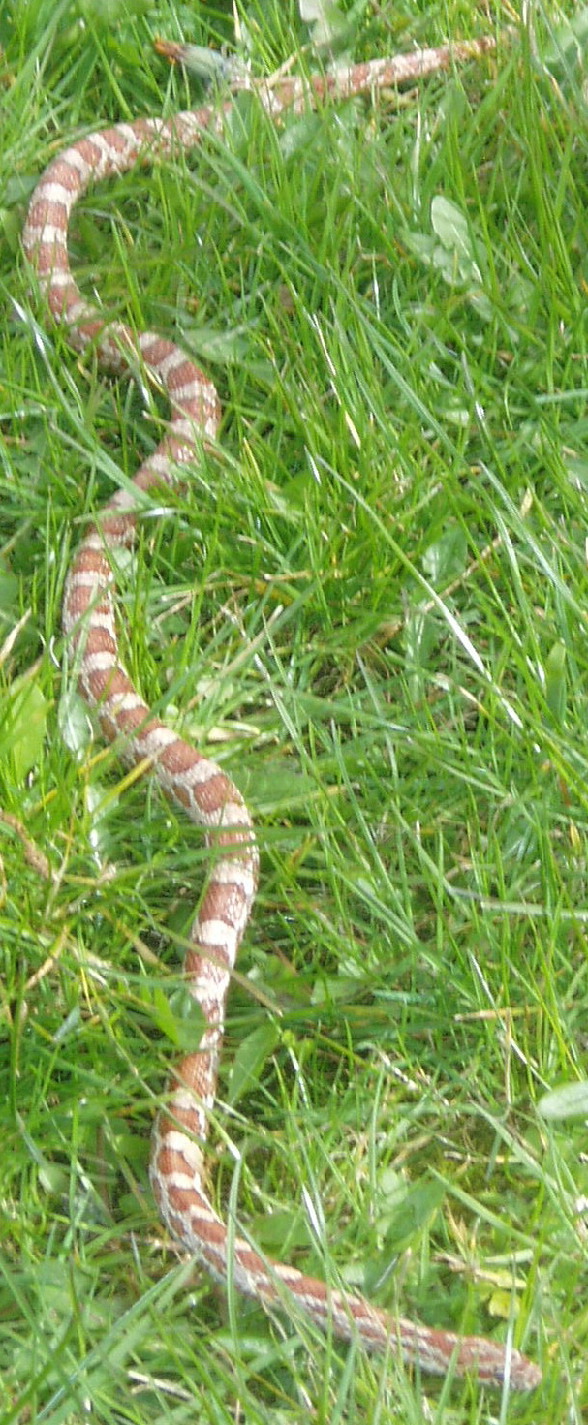 |
 |
What is this snake?: |
| Author | Message |
|
Vicky Member Joined: 10 Apr 2006 No. of posts: 3 View other posts by Vicky |
Posted: 10 Apr 2006 Hi I know nothing about snakes, but found this in my garden in SE Cornwall on Saturday morning. It was about 1 metre long, and 3cm across. It stayed sunbathing all day before slithering away around 6pm. I assumed it was a grass snake, but the markings weren't similar to those on any images I've seen. Mind you, it doesn't look like an adder either. Can anyone help? Vicky |
|
Vicky Member Joined: 10 Apr 2006 No. of posts: 3 View other posts by Vicky |
Posted: 10 Apr 2006 Here's another photo:  |
|
John Newton Senior Member Joined: 19 May 2005 No. of posts: 151 View other posts by John Newton |
Posted: 10 Apr 2006 Hi Vicki What you have found is an escapee Corn Snake (E.Guttata Guttata), presumably from a local hobbyist. It seems to be one of the many colour variants that now exist, as opposed to the more traditionally coloured individuals, but there are huge numbers of these around in private collections, so I guess the chances of coming across an escapee are quite real. Cheers John Newton South Yorkshire ARG |
|
Dan Kane Senior Member Joined: 30 Dec 2005 No. of posts: 201 View other posts by Dan Kane |
Posted: 10 Apr 2006 Vicky, Well, well, well, if it isn't another escapee herp. What John said is correct, it is a Corn Snake, E.Guttata, and one of the many hundreds of variants on the market. It also looks like it's going to shed it's skin soon, check the milky eye colouration. In thuis state, a snake woud normally find somewhere to rest and hide for a few days, prior to sloughing. Unfortunately, it's striking colouration may be its demise, as it will now be obvious to any preadator in the area, making easy pickings, if it survives tonight... If it comes back to your garden, I suggest you capture it, and take it down to your nearest animal shelter or vets, they will look after it, or alternativly, you could ask around your area, or put up posters asking whose snake it is, and someone may step forward to (re)aquire a lovely snake. Dan www.randacumbria.moonfruit.com |
|
Vicky Member Joined: 10 Apr 2006 No. of posts: 3 View other posts by Vicky |
Posted: 10 Apr 2006 Thanks for that. It certainly looks like some corn snake pictures I've found. I'm a bit surprised, as I live in the middle of nowhere! Also I've read that they're nocturnal, and this was happily sunbathing for 8 hours. Do I need to report this sighting somehow, or are they relatively common escapees? Thanks again for the info Vicky |
|
mikebrown Senior Member Joined: 30 Jun 2005 No. of posts: 95 View other posts by mikebrown |
Posted: 10 Apr 2006 Hi Vicky, Although Corn Snakes are more nocturnal in the Summer, this one will have been drawn out by the sun in order to warm itself up in what would otherwise be quite cold and damp surroundings at this time of year. You do not need to report the sighting, but as Dan says, you could try to find the owner or a suitable person to look after it. Maybe someone on this site will take it if it reappears? I would love to claim it myself as a companion for my very similar one, but unfortunately I live several hundred miles away! Corn Snakes are completely harmless and non-aggressive, by the way, and feed on rodents mostly.
Mike Brown Merseyside ARG |
|
Mika Member Joined: 03 Apr 2006 No. of posts: 21 View other posts by Mika |
Posted: 11 Apr 2006 Hi Vicky, You may find a lady known as Tanya Stevens (founder of the Corn Snake Fan Club) very helpful. She will be able to tell you the morph for certain (it looks like a candycane to me but I am probably wrong!) and she will probably be able to home it for you as well. Her e-mail below..... Hope this helps.
|
|
-LAF Senior Member Joined: 03 Apr 2003 No. of posts: 317 View other posts by -LAF |
Posted: 11 Apr 2006 Corn snakes are easily one of the most commonly kept snake species in the UK. They're hardy, feed well and are non aggressive. Because they're common captives they are common escapees too. I used to keep a pair of corn snake and one did a runner (or slither) for 7 months before turning up on my doorstep in November, in great condition (read FAT). They eat rodents and birds. As has been mentioned, captive breeding means that, like canaries, corns snakes now come in a bewildering range of colours. This one looks to be what is called 'amelanistic', which means there is no black pigment present. A quick note on taxonomy, the corn snake has been moved form the genus Elaphe, and has been reassigned as Patherophis guttatus. Lee Fairclough |
- What is this snake? |